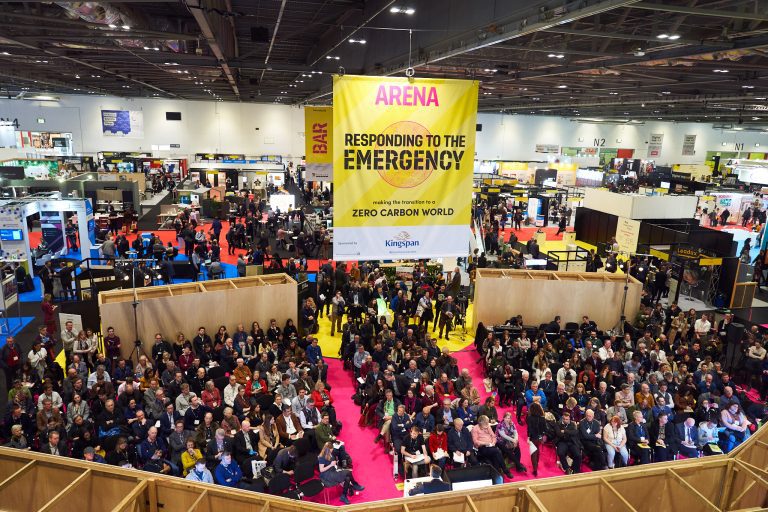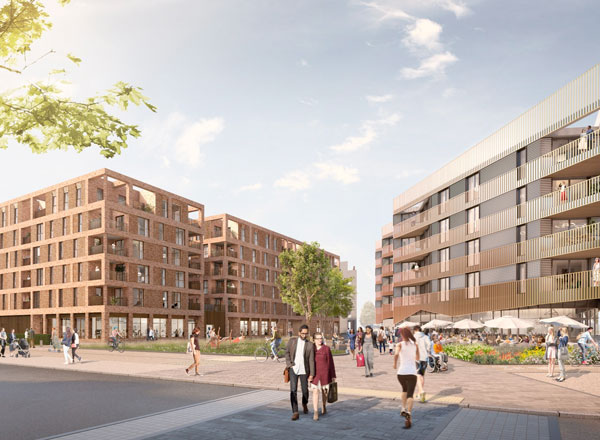As part of the 10th annual World Green Building Week, the World Green Building Council (WorldGBC) has issued a bold new vision for how buildings and infrastructure around the world can reach 40% less embodied carbon emissions by 2030, and achieve 100% net zero emissions buildings by 2050. Together, building and construction are responsible for 39% of all carbon emissions in the world[1], with operational emissions (from energy used to heat, cool and light buildings) accounting for 28%. The remaining 11% comes from embodied carbon emissions, or ‘upfront’ carbon that is associated with materials and construction processes throughout the whole building lifecycle. WorldGBC’s vision to fully decarbonise the sector requires eliminating both operational and embodied carbon emissions. The ‘Bringing embodied carbon upfront’ report proposes this ambitious goal alongside solutions to accelerate immediate action by the entire building and construction value chain. The vision is endorsed by representatives from developers and construction companies, financial institutions, city networks and government, as well as industry representatives from concrete, steel and timber and many more including: HeidelbergCement, Skanska, Stora Enso, Google and the Finnish Government. The report sets out to demystify the challenge of addressing embodied carbon emissions, through breaking down complex terminology and creating a common language to set a consensus-built definition for net zero embodied carbon. Embodied carbon emissions have been overlooked in the past but as shown by milestone research from the Intergovernmental Panel on Climate Change (IPCC), achieving drastic cuts in all carbon emissions over the next decade is critical to keeping global temperature rise to 1.5oC. Addressing upfront carbon is therefore crucial to fighting the climate crisis, as new construction is expected to double the worlds building stock by 2060 causing an increase in the carbon emissions occurring right now. Therefore, the new report is calling for coordinated action from across the sector to dramatically change the way buildings are designed, built, used and deconstructed. WorldGBC presents a clear pathway of actions that designers, investors, manufacturers, government, NGOs and researchers across the whole value chain can take to accelerate decarbonisation, address current market barriers and, develop low carbon alternative solutions for market. However, the report warns that change will not happen unless there is a radical shift in how industry works together to enable a market transformation. The transition towards mainstream net zero carbon standards requires immediate action to achieve greater awareness, innovation, improved processes to calculate, track and report embodied carbon, voluntary reduction targets from industry and roll out of new legislation at city, national and regional level. Approaches such as maximising the use of existing assets, promoting renovation instead of demolition and seeking new circular business models that reduce reliance on carbon intensive raw materials are also needed. To kick-start cross-sector collaboration, WorldGBC is calling for new national and sectoral roadmaps to be developed, such as those produced in Finland, Norway and Sweden, with strong support from industry and policymakers. Demonstrating the feasibility of achieving zero carbon goals, the report is supported by case studies of existing best practice across the whole breadth of the building industry. Businesses involved in design and delivery have already committed to ambitious individual or national decarbonisation strategies. For example, Skanska, a major development and construction group is making strides in enabling projects to be evaluated for full lifecycle impacts. Materials suppliers are also taking a leading role. HeidelbergCement has committed to developing carbon neutral products by 2050, and Dalmia Bharat Cement, one of India’s leading cement manufacturers, is committed to becoming a carbon negative group by 2040. Cities have also been instrumental in pushing for new innovations and approaches. Oslo, Norway, has a commitment to fossil free construction sites. Vancouver, Canada, has mandated that embodied carbon be reduced in new buildings by 40% by 2030, as part of its climate emergency response, demonstrating the type of regulatory frameworks that can drive market change. Quotes: Cristina Gamboa, CEO, World Green Building Council says: “Our new report is a solution focused response to the urgent need to significantly reduce upfront emissions in buildings and construction and demand action across carbon intensive industries and materials. With the support of our global network and the endorsements we have received for the report, we are confident that we can stimulate market demand and facilitate radical whole value chain collaboration that will be truly transformative and benefit both people and planet. “We will accelerate action to achieve our goal of slashing embodied carbon by 40% by 2030 and securing net zero embodied carbon by 2050, in addition to our net zero operational carbon goals.” Mark Watts, Executive Director, C40 says: “The majority of the world’s population live in cities, projected to rise to 70% by 2050. As cities continue to grow, and temperatures continue to rise dangerously, it has never been more important for the buildings and construction sector to be leading the way on climate action. Because the sector is responsible for such a large chunk of global emissions, it means there is huge potential for reduction. It is excellent news that the pathways laid out by the World Green Building Council contain an interim target for 2030 – as we know how important this date is for getting the world on track to limit global temperatures to 1.5C. Now the sector needs to mobilise immediately to put these changes into action for global benefit. Collaboration between sectors and organisations will be key to achieving this transformation – and at C40 we are looking forward to supporting cities to make it a reality.” Anders Danielsson, President & CEO, Skanska says: “This report sets out bold ambitions for embodied carbon reduction in the built environment which we welcome at Skanska. We recognise our responsibility and see an increased sense of urgency in our work to reduce carbon, which started many years ago. As we move forward, greater transparency on carbon emissions is needed throughout the whole value chain. Tools like the EC3 which we have developed with partners can help with this. But this is not










